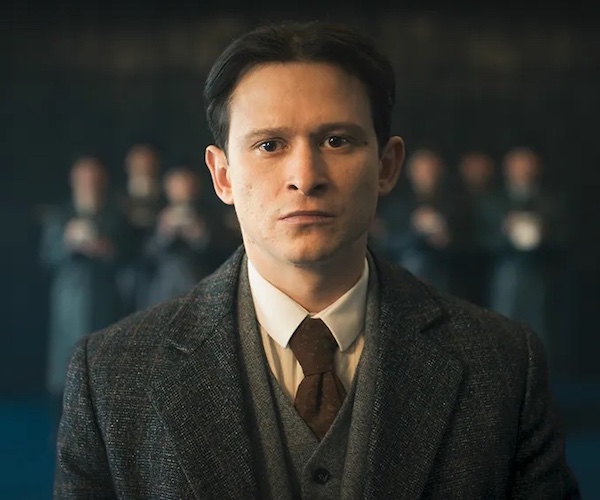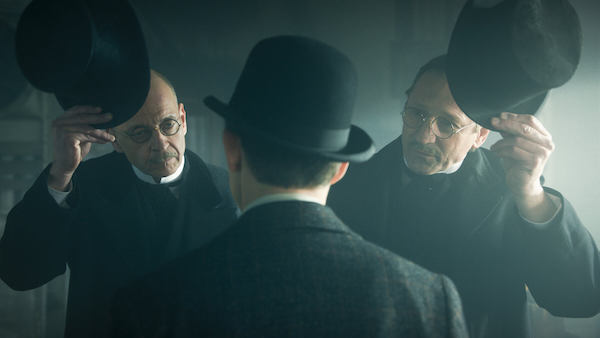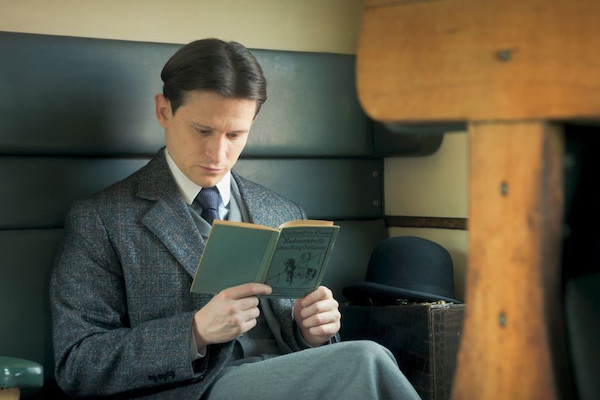Television Review: “Kafka” — A Gripping Biopic of the Ever-Iconic Author
By Kai Maristed
What could have gone terribly wrong goes terrifically right in the hands of this creative team, culminating in a convergence of the life, the oeuvre, and our protagonist’s encroaching agony.
Kafka, a six-part TV series from Germany’s ARD Network. Produced by ORF, ARD, and Superfilm. Directed by David Schalko. Written by David Schalko and David Kehlmann, based on Reiner Stach’s biography of Kafka. Steaming on ChaiFlicks, starting June 6.

Joel Basman as Kafka in Kafka. Photo: ORF/Superfilm/Nicole Albiez
“Where to start?” was my initial, spontaneous first line for this review. Such an amateurish blurt. Then I recalled that the creators of Kafka asked themselves the same question, not once but six times, in the voice-overs introducing each episode of this highly dramatic, now funny, now affecting biopic of the ever-iconic author. (A New York Times piece details his curious metamorphosis to TikTok heartthrob.) Should the series begin at the far end of the telescope, after the hero’s death, showing best friend Max Brod’s nearly miraculous rescue of unpublished manuscripts (which he had promised to burn) from the inrushing Nazis? Last train from Prague, literally. Or, more conventionally and Freud-ishly, depict a cozy-to-stifling assimilated Jewish bourgeois childhood? Why not X-ray enigmatic young Felice Bauer, and K’s mysteriously marathon long engagement to her? Or her successor and near opposite, Milena, his flirty, emancipated translator and, as presented here, real true love? Or: shouldn’t attention be paid to that activity that consumes most people’s waking hours? In Kafka’s terminology, his “breadwork,” as an adjuster with the semigovernmental Workers’ Accident Insurance Company. Many of these elements are well known to Kafka’s fans, so there’s no serious spoiler risk. The challenge for this review is to save for Kafka‘s viewers the pleasure, shock, and surprise of new discoveries, some historically recent. The clichés I’d absorbed paled beside this fresh, entirely human portrayal. But meanwhile, where to start?
Franz Kafka was born on July 3, 1883, in Prague, then part of Austria-Hungary. He died on June 3, 1924, in Kierling, Austria. Scarcely 40 years, just enough of a lifespan — allowing for long days of “breadwork,” and going without sleep — to write a generous handful of tales and fragments, including “Metamorphosis,” The Trial, The Castle, and “In the Penal Colony.” A dull life, he (like many other writers) would insist. Hardly enough drama, you’d think, to fill six hourlong episodes. And indeed, in the past there were few attempts at biography. Those that were made went out of print until the publication, culminating in 2014, of three deeply researched volumes composed over many years by Rainer Stach. The TV series Kafka is based on that lengthy trilogy, so one sympathizes with the voiced head-scratching of “Where to start?” Not to mention the dilemma of “What to show, what to leave out?” Given Kafka’s passionate, partisan readership, the screenplay job must have looked like an invitation to a beheading.
Two years ago, the major German broadcasting company ARD announced its project of a Kafka biopic, generating considerable excitement in the German-language world. I was excited, and earmarked the announcement, figuring I’d finagle a way to watch from the US when the time came. What amazing luck, now, to receive a reviewer’s link to the full series, with skillfully translated subtitles. And then to learn that the daunting job of co-screenwriter had gone to Daniel Kehlmann, one of the most creative and intelligent writers working in any language today.

Kafka encountering two lookalike men in Kafka. Photo: ORF/Superfilm/Nicole Albiez
But great expectations all but guarantee a degree of disappointment. How would even a stylist like Kehlmann handle the dichotomy between Kafka’s monumental global public persona and the delicate/ruthless/fey/self-deprecating Franz one meets via letters and contemporary accounts? Above all, how to connect the man to his books, to tales that shocked contemporaries and have continued to disquiet and inspire generations of readers and writers since his death in relative obscurity? After all, it’s not everyone who merits an “-esque” after her/his name. Kafkaesque: you know instantly what that means. There’s no other word for it.
Max, Felice, Family, Office, Milena, Dora. Each of the six titled episodes is constructed much like a short story, in scenes beautifully framed by director David Schalko, with dialogue drawn from the fiction and documents. Kafka‘s verisimilitude, one’s sense of being there, is aided by assured camera work (no flashy cuts) and strengthened by a limited array of backgrounds that provide each ‘”story” with a distinctive visual signature (that dining room, Franz’s tortured bed, a nightclub, a lush landscape of stream and waving grass). Each episode is gripping — I hung on every word — and provides a satisfying arc while opening the door for the one to come. Each explores a separate aspect of Kafka’s nature and experience, sometimes paralleling one another in chronology, but braiding major themes together as they, and he, near the end. Subjects such as his relationship to his Jewishness and to Zionism, to unionization and the workers’ cause. To women, and desire.
So far, so original and clever, fresh and entertaining. But Kehlmann and team take a bold additional risk. Without warning, the strict realism of, say, a family dinner, a literary reading, or a night on the town segues into an equally “realistic” dramatization of one of K’s works. Like those stories, these vivid interweavings are not for the faint of nerve or stomach. (Remember “In The Penal Colony”?) What could have gone terribly wrong goes terrifically right in the hands of this creative team, culminating in a convergence of the life, the oeuvre, and our protagonist’s encroaching agony. Like Keats, Kafka seems to have sensed from early days that his days were counted. He wrote through the nights, he took no vacations, he never made the trip to Palestine. And how many pages, beyond those that Brod saved and Germany and Israel later squabbled over, went lost forever?

Joel Basman as Kafka in Kafka. Photo: ORF/Superfilm/Nicole Albiez
No question: the screenplay succeeds in squaring the circle. But what about the casting? Most of us have seen a photo of young (always young for his age) Franz. The combination of black, sparkling eyes and formal diffidence (does he dislike the nosy camera?), the black hat emphasizing ears that need no further emphasis.… What actor could embody enough of this look, along with the writer’s intelligence, wit, and dedication? The steely demand of artistic integrity — for himself, for others — beneath the physical and psychological vulnerability?
Enter Joel Basman, as if born for the role. Charming, awkward, mercurial, quick with a comeback, as who wouldn’t be, having memorized Kafka’s own words? No mopey melancholic (although subject to fits of deep depression), this Franz K. swings through morning calisthenics and “Fletcherizes” his food (a fad of the era, chewing each bit 40 times), to the exasperation of his ogre father and adoring womenfolk alike. And the supporting cast? Sharp, (almost) irresistible, emancipated Milena is played by Liv Fries, the delightful, feisty protagonist of Berlin, Babylon. (Highly recommended as well.) They are a perfect, sexy match. Nicholas Ofczarek inspires loathing as the oafish autocrat at the dinner-table, Franz’s father. Brod, sister Ottla, Franz Werfel, an effervescent Yiddish actor — all convincing. Only Felice remains opaque — whatever did Kafka see in her, as portrayed by this stiff actress? Food for speculation. A Madonna complex?
Most of the competing theories that try to explain Kafka’s genius are given a nod in this production. But, of course, they all miss the point. No theory can account for the storytelling obsession (of writer, of reader) that results in say, The Trial. A book you cannot put down from sentence to sentence, despite a growing sense of apprehension unrelieved by witty observations and Josef K’s optimism. You’re caught in a fog of confusion, mocked by the pseudo-clear progression of events. The book feels like a journal of the fearsome absurdity of life that we can’t admit.
Catch Kafka if you can. It’s excellent TV, to say the very least. I laughed, I was outraged, I adored that Yiddish actor. And finally, although there’s no trace of self-pity in the hero’s own awareness of his painful sacrifices for literature, I struggled with tears at the end.
Kai Maristed (www.kaimaristed.com) studied politics and economics in Germany; she lives in Paris and Massachusetts. She has reviewed for the Los Angeles Times, New York Times, and other papers. Her four books include the collection Belong to Me, starred by Publishers Weekly, and Broken Ground, a Berlin Wall story. Recent work is in Five Points, Ploughshares, and Agni. Her new collection, The Age of Migration, won this year’s inaugural Kevin McIlvoy Book Prize.


This is a wonderful review and I cannot wait to see series. Many thanks!